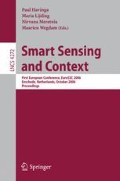Abstract
Although context-aware and autonomous services could eventually automatically adapt home environments to user needs, there is a risk of creating environments in which people experience a lack of control. The perceived level of user control in aware home environments might be correlated to the level of system initiative. Consequently, perceived user control might be improved by dynamically adapting the system-initiative level to the individual users and context. Towards creating the optimal balance between system-initiative and user control in a sensitive and personalized home environment, an experimental study has been conducted in a realistic setting. In the experiment, participants were willing to give up partial control. However, participants regularly switched to manual control in order to slightly change system settings. The study suggests a feedback mechanism is crucial to improve system behavior in time, and increase the acceptability of autonomous services in the home.
Access this chapter
Tax calculation will be finalised at checkout
Purchases are for personal use only
References
Abowd, G.D., Mynatt, E.D.: Charting past, present, and future research in ubiquitous computing. ACM Trans. Comput.-Hum. Interact. 7(1), 29–58 (2000)
Bardram, J.E., Christensen, H.B.: Open Issues in Activity-Based and Task-Level Computing. In: First International Workshop on Computer Support for Human Tasks and Activities, Vienna, Austria (2004), Centre for Pervasive Computing Technical Reports
Barkhuus, L., Dey, A.: Is Context-Aware Computing Taking Control Away from the User? Three Levels of Interactivity Examined, pp. 1–8 (2003)
Tolmie, P., Pycock, J., Diggins, T., MacLean, A., Karsenty, A.: Unremarkable Computing. CHI Letters 1(1), 399–406 (2002)
Vastenburg, M.H., Keyson, D.V., de Ridder, H.: Interrupting People at Home. In: IEEE International Conference on Systems, Man and Cybernetics, The Hague, The Netherlands (2004)
Author information
Authors and Affiliations
Editor information
Editors and Affiliations
Rights and permissions
Copyright information
© 2006 Springer-Verlag Berlin Heidelberg
About this paper
Cite this paper
Vastenburg, M.H. (2006). Losing Control in Pro-active Home Environments. In: Havinga, P., Lijding, M., Meratnia, N., Wegdam, M. (eds) Smart Sensing and Context. EuroSSC 2006. Lecture Notes in Computer Science, vol 4272. Springer, Berlin, Heidelberg. https://doi.org/10.1007/11907503_29
Download citation
DOI: https://doi.org/10.1007/11907503_29
Publisher Name: Springer, Berlin, Heidelberg
Print ISBN: 978-3-540-47842-3
Online ISBN: 978-3-540-47845-4
eBook Packages: Computer ScienceComputer Science (R0)

